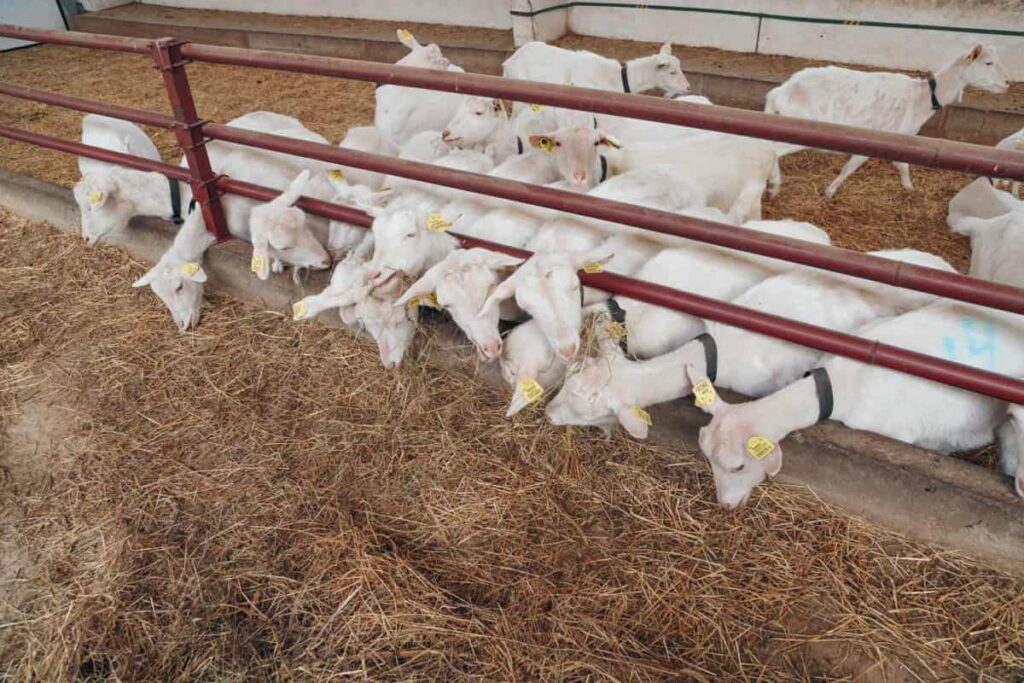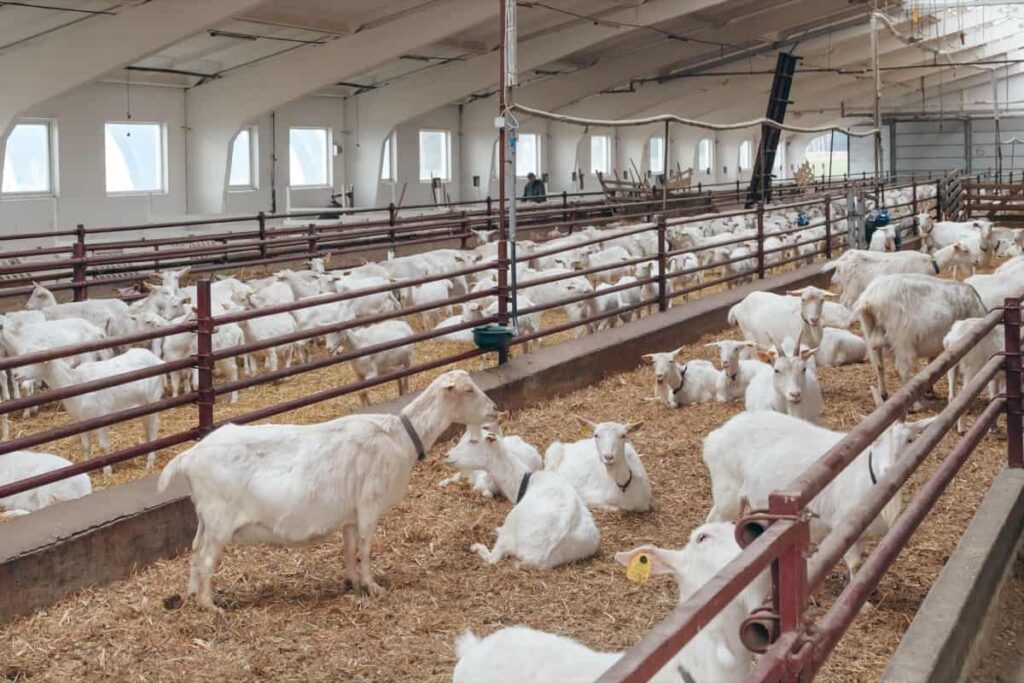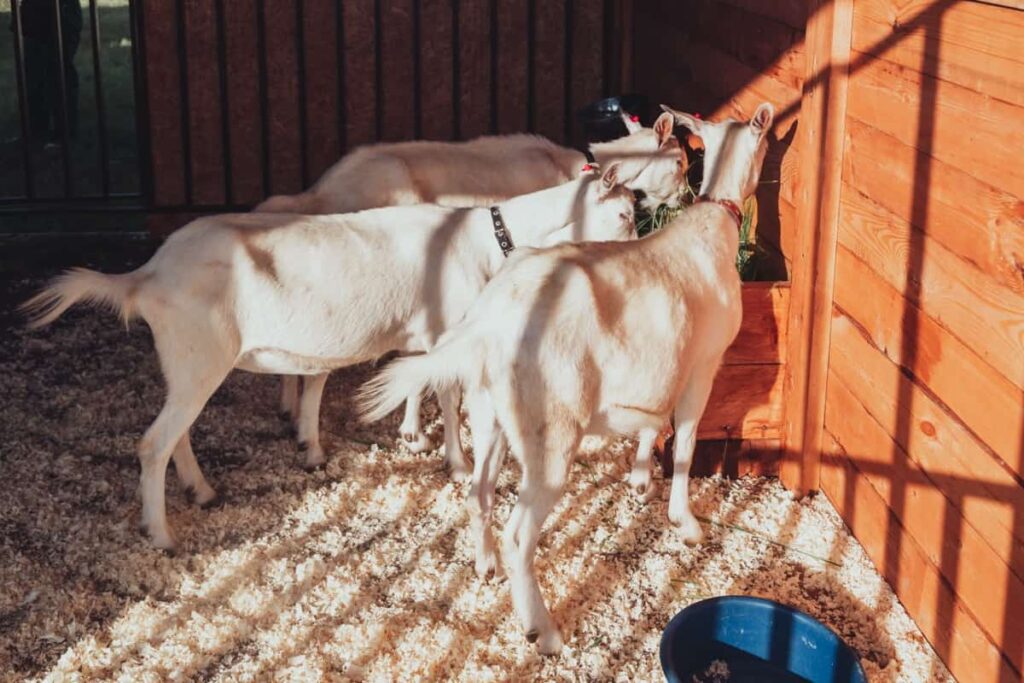Dairy goat farming is animal husbandry in which goats are raised for milk production. This practice is an important source of income and food for many people today. Dairy goat farming is raising goats specifically for their milk, which can be used to produce various dairy products. Goats are smaller, requiring less space and feed to produce milk. Dairy goats are known for their delicious milk.

Goats are hardy animals that can adapt well to different environments, and it is an ideal choice for small-scale farmers who want to produce high-quality milk without investing too much money or time. Unlike cows, goats require less space, feed, and water while producing much milk.
Dairy Goat Farming Information
Breeds Suitable for Dairy Goat Farming
Various breeds of dairy goats are available, such as Alpine, LaMancha, Saanen, Toggenburg, Nubian, and Oberhasli, with different characteristics, including milk production level and temperament. Some farmers choose to specialize in breeding purebred dairy goats, while others may crossbreed them for better results.
Housing and Fencing for Raising Dairy Goats
- Providing safe and comfortable housing for your dairy goats is essential in ensuring their health and productivity. When designing or choosing a shelter, it should be spacious to accommodate all the goats and allow them to move around freely.
- The materials used in building the shelter should also be durable, easy to clean, and provide adequate ventilation. You should use wood or metal for framing, while roofing can be made of metal sheets.
- Fencing is equally important as it helps keep your goats within your property boundaries while keeping out predators such as coyotes or dogs. Fences should have sturdy posts with wire mesh attached securely at least 5 feet high.
- Another option is electrical fencing which delivers mild shocks to animals when they try crossing it. This type of fence requires regular maintenance but can deter even larger animals from entering the pasture.
- Providing ample space for housing and secure fencing will ensure that your dairy goats remain healthy, happy, and productive throughout their lifespan on your farm.
Requirements for Raising Dairy Goats
- One of the most important aspects of caring for dairy goats is their nutrition. These animals require a balanced diet of hay, grains, and fresh water.
- Dairy goats also need a clean and safe living environment. Housing should provide ample space for movement and good ventilation while protecting them from extreme weather conditions. Fencing is another important aspect, as it keeps predators away while preventing the animals from escaping.
- In addition to space, shelter is crucial for protecting your goats from harsh weather conditions such as extreme temperatures, rain, or snowfall. A good quality shelter should provide enough ventilation while keeping drafts out.
- Feeding dairy goats involves providing a balanced diet rich in fiber and protein. The diet should consist primarily of hay or grass and supplements like grain, minerals, and vitamins, depending on their age group.
- Regular veterinary care is also crucial in maintaining the health of your dairy herd. Vaccinations against common diseases like tetanus and rabies are recommended yearly, and regular check-ups are to monitor general health. In addition to these requirements, providing adequate exercise opportunities such as pasture access or daily walks can keep your dairy goats active while preventing obesity.
In case you missed it: Goat Breeding and Genetics for Improved Productivity and Disease Resistance

How to Increase Goat Milk Production?
- Firstly, providing your goats with high-quality feed and water is essential for their health and productivity. A balanced diet containing adequate protein, vitamins, and minerals will help your goats produce more milk.
- Next, make sure to maintain good hygiene practices in the milking area. This includes keeping the udders clean before milking and thoroughly sanitizing all equipment used during milking.
- Regularly monitoring your goats’ health is also crucial to maximizing milk production. Any signs of illness or infection should be addressed immediately to prevent any negative impact on milk yield.
Steps to Start Dairy Goat Farming
- The first step is to research the different breeds of goats to determine which one will best suit your needs.
- Once you have chosen your breed, it’s important to ensure that you have enough space for them to roam around and graze. A minimum requirement would be about ¼ acre per goat.
- Next, ensure adequate shelter for them during inclement weather or at night. Goats prefer dry and draft-free environments, so invest in good quality shelters to rest comfortably.
- Another crucial aspect is fencing. Fencing should be sturdy enough to keep predators out while keeping your goats secure within the premises.
- Find a reputable source to purchase healthy goats free from diseases or infections. Starting small with two or three does and a buck would be ideal until you become familiar with their care requirements before expanding your herd size.
- A successful dairy goat farm is possible with proper management practices such as regular health checks, balanced nutrition plans, hard work, and dedication.
How to Feed Dairy Goats?
Feeding dairy goats is a crucial aspect of ensuring their health and productivity. A well-balanced diet will promote milk production and enhance the quality of the milk. The primary food source for dairy goats is hay, which can be supplemented with grains or pellets. It’s essential to provide good-quality hay free from mold and dust. Goats need about 2-4 pounds of hay per day, depending on their size and stage of lactation.
Grains such as corn, oats, and barley can be fed in small amounts to supplement the goat’s diet. It’s important always to offer fresh water as dehydration can lead to serious health problems like urinary calculi in male goats. Avoid giving your goat water directly after feeding them since it may hinder digestion. In addition to providing feed, ensure you give mineral supplements rich in calcium and phosphorus.
These minerals help prevent metabolic diseases like milk fever commonly seen in lactating does. Proper nutrition plays a vital role in achieving success in dairy goat farming. Offering high-quality feed, mineral supplements, and access to clean water ensures optimal growth rates while maintaining healthy animals throughout their productive lives.
In case you missed it: Innovative Housing and Shelter Designs for Profitable Goat Farming

Conclusion
Dairy goat farming involves breeding, feeding, milking, and health management. Farmers must select the best breeds that suit their geographical location and market demands. They must also ensure that their goats receive proper nutrition through regular feeding with a balanced diet.
- Types of Grass Growing for Goat Farm
- How to Train Goats for Milking: A Beginners Guide
- Goat Milking Practices and Equipment: A Beginner’s Guide
- Goat Farming for Fiber: Producing Mohair and Cashmere
- Maximizing Goat Milk Production: Tips for Dairy Goat Farmers
- Goat Farming as a Family Business: Strategies for Success
- Profitable Kenya Goat Breeds for Commercial Dairy and Meat Business
- Unlock the Secrets of Oberhasli Goat: Discover Raising and Management Practices
- Ultimate Guide to Myotonic Goats: Explore Profile to Raising
I want to be open a goat farm, Please suggest me to how to get a goat farming loan.
Read this: Goat Farming Subsidy and Loan.